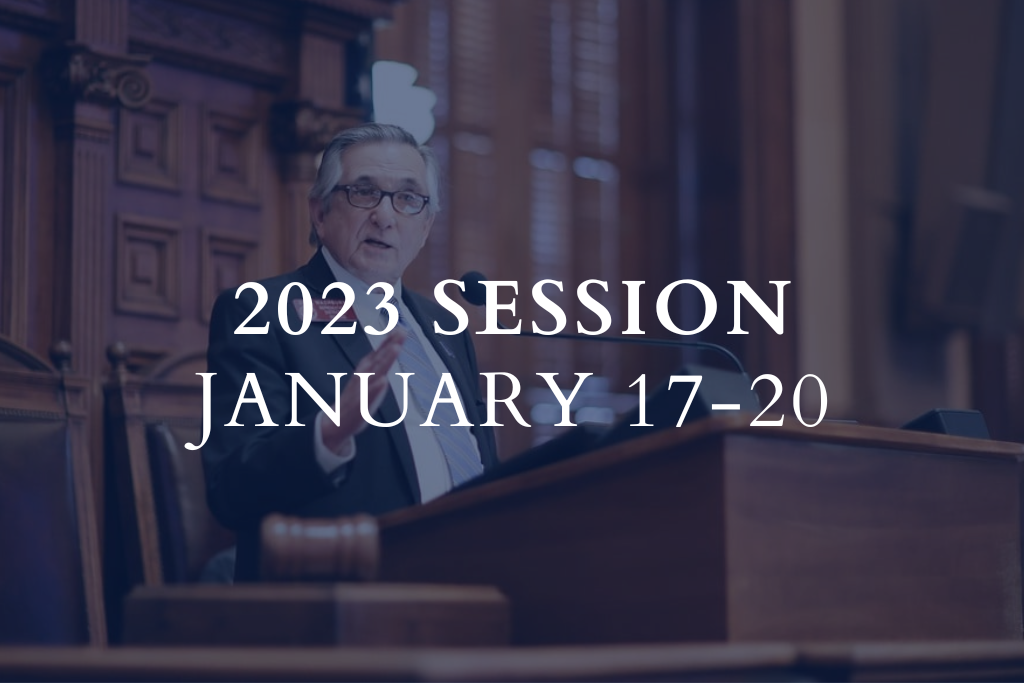My colleagues and I returned to the Georgia State Capitol for the highly anticipated “budget week” on Tuesday, January 17. To begin the state budget process, the Georgia General Assembly devoted the entire second week of session to holding joint House and Senate Appropriations hearings. During the first hearing of the week, Governor Brian Kemp gave opening remarks that highlighted his budget recommendations for the current and upcoming fiscal year budgets, which will become legislation that will ultimately guide our state’s spending. Throughout the week, we also heard directly from state agency leaders regarding their budgetary requests, as well as the state economist, who provided a comprehensive overview of Georgia’s economic forecast for this year. Our second week under the Gold Dome was certainly busy as we worked to strategically invest our state revenues to best serve the needs of all Georgians.
Each legislative session, as required by our state constitution, the General Assembly must pass a balanced state budget. After reviewing Gov. Kemp’s budget proposals presented this week, my colleagues and I will begin drafting two budget bills: the Amended Fiscal Year 2023 (AFY 2023) budget and the Fiscal Year 2024 (FY 2024) budget. First, the amended budget directs spending for the remainder of the current fiscal year and uses a more accurate estimate of state revenue to account for any differences between the projected estimate and actual revenue obtained. Based on updated revenue estimates, the AFY 2023 budget will include approximately $2.3 billion in additional revenue that our state can utilize over the next six months; this is great news for our state and reflects the hard work that the governor and the legislature has done in the aftermath of the global pandemic.
Next, the FY 2024 budget will determine state spending for the entire upcoming fiscal year beginning on July 1, and this full budget is set at a revenue estimate of $32.4 billion. The governor’s version of the current and upcoming fiscal year budgets includes a range of budgetary items that prioritize the education, health and safety of Georgians, as well as investments that will help keep Georgia a competitive state to live, work and raise a family.
To that end, Georgia has experienced record-breaking growth in new jobs and investment across our state, and the governor predicts that our state is ready to weather any economic storm that may come this year. However, Georgians across our state are feeling the effects of 40-year high inflation that’s plaguing the entire country, and as such, his budget recommendations pave the way for providing financial relief to Georgians amid this record high inflation. Due to the positive economic outcome from the previous fiscal year and encouraging projections for our future, the governor recommends allocating $1 billion in undesignated funds from the AFY 2023 budget to provide a one-time tax refund to every eligible taxpayer in our state; these one-time tax refunds would range from $250 for single filers to $500 for joint filers. Furthermore, Gov. Kemp also announced his plans to create the one-time Homeowner Tax Relief Grants program using $1.1 billion in the AFY 2023 budget. Every eligible homeowner would have a chance to receive a $20,000 exemption for their assessed home value on their 2023 property tax bill, and the governor estimates that this exemption would result in an average savings of $500.
Educating Georgia’s young learners continues to be a top priority for the governor heading into his second term, and investing in our future workforce is certainly reflected in his budget priorities for both budget years. The amended budget includes an additional $745 million and more than $1.1 billion is included in upcoming fiscal year budget for K-12 education. These investments would fully fund the Quality Basic Education program, increase salaries for certified personnel by $2,000 during the next school year, as well as provide $15 million in grant funding in the year’s amended budget to help paraprofessionals pursue a teaching certification. Teachers today are preparing our state’s leaders of tomorrow, and it is crucial that we invest in those who devote their careers to our students. To enhance school safety and address security needs, the governor also recommends dedicating $115 million in the amended budget to provide $50,000 school safety grants to every K-12 school across our state. Ahead of the next school year, funding for school counselors would also see a boost of $26.9 million to help address our students’ mental health and emotional well-being. His version of the amended budget also includes $25 million for learning loss grants to allow individual schools to create programming that is geared towards closing learning gaps due to the pandemic. Finally, to address the increasing costs of college tuition, the governor proposes using $61.2 million in the FY 2024 budget to fully fund the Georgia’s HOPE scholarship and grant awards at 100 percent of tuition at all Georgia public higher education institutions. Gov. Kemp estimates that full-time students would save an average of $444 annually while earning their degrees, and these saving would help ensure more students than ever can reduce the out-of-pocket costs of college and remove barriers from achieving the education necessary to equip our future workforce.
During the previous fiscal year, our state benefited from a record number of economic development projects that total more than $21.2 billion in direct investment to Georgia, including the Rivian and Hyundai electric vehicle plants that will call our state home. To develop a highly skilled workforce for these facilities and other job-creating projects, the governor’s amended budget proposal includes $130 million to develop two new QuickStart EV training facilities overseen by the state’s technical college system. Additionally, he also recommends dedicating $166.7 million in the AFY 2023 budget for the state’s Regional Economic Business Assistance program, which would assist local governments with providing incentives to businesses looking to grow their footprint. The governor also seeks to move $35.7 million in existing funds for the OneGeorgia program to establish a Rural Workforce Housing Fund; this new fund would allow local development and housing authorities prepare land for housing developments that would help make the housing market more affordable for local workforces.
Furthermore, the governor’s budgetary recommendations seek to improve health care access and affordability in Georgia through a few different measures. First, the governor’s FY 2024 proposal includes $52 million to implement the Georgia Pathways to Coverage program to expand health insurance access to uninsured residents; this program was established through the Patients First Act, legislation which was passed by the General Assembly in recent years. The governor also seeks to further support the state’s reinsurance program using $92 million in both budget proposals. The reinsurance program has reduced premiums by an average of 12.4 percent for the 2023 reinsurance plan compared to premiums without the program, allowing participants to see an average annual premium reduction of $995 or $83 per month. Starting in April 2023, the state will examine Medicaid eligibility for plan participants, which was previously delayed by the federal government due to the Public Health Emergency. To ensure every vulnerable citizen is cared for during this complicated process, the governor proposes $8.4 million in the AFY 2023 budget and $3.2 million in FY 2024 budget to pay for additional caseworkers and other associated costs needed for this redetermination process.
Keeping every Georgian safe is another top priority of Gov. Kemp this session. During the last legislative session, the governor set aside funding in his budget proposal to build a new state prison that is more secure and costs less to maintain. While the new prison is being constructed, the governor allocates funding in both budget proposals to help maintain the current correctional facilities. His amended budget includes $51 million and the upcoming fiscal year includes $26 million in bond funds to address emergency maintenance and repairs on existing facilities and prisons. An additional $25 million in is included in the FY 2024 budget proposal to prepare a new state prison that aims meet the correction system’s space needs.
The governor also recognizes the importance of appropriating state funding to retain the bright individuals who make up Georgia’s public workforce. Gov. Kemp’s FY 2024 budget would provide assistance to dedicated law enforcement agencies as they ramp up their retention and recruitment efforts. Gov. Kemp recommends investing $3.2 million in a loan repayment plan for 800 state and local law enforcement officers starting in the upcoming fiscal year; the plan would offer a loan repayment of up to $20,000 per officer in exchange for five years of service; these loan repayment programs would help local law enforcement agencies attract officers to their ranks in this competitive job market. I also want to highlight the governor’s plan to invest in our state employees, who ensure our state operations run efficiently and effectively as it serves citizens. In the governor’s FY 2024 budget plan, approximately $243 million would be used to provide state employees with a $2,000 cost-of-living increase. It’s crucial that our state government remain a competitive employer with other government entities, and these funding initiatives would help retain public workers and avoid costly recruiting and training costs.
Now that the joint budget hearings have concluded, the House Appropriations subcommittees will begin to meet separately to review specific portions of the budget and delve deeper into the state agencies’ budget needs. Since the Georgia Constitution requires the budget bills to originate in the House, each House Appropriations subcommittee will pass their respective portions of the AFY 2023 and FY 2024 state budgets, which will collectively result in two complete budget bills to be approved by the full House Appropriations Committee. Then, each budget bill will need to be scheduled for a vote on the House floor by the House Rules Committee. After the budget bills make their way through the House, these bills will be transmitted to our counterparts in the Senate, where each bill will undergo the same process. There will likely be changes to the governor’s original proposals as the House and Senate continue to work through the budget process, and I will keep you updated as these bills are finalized.
The House will be back in session on Monday, January 23, and we have another busy week ahead as the pace of the session continues to pick up. As we move forward, I encourage you to visit me at my capitol office, or call me if you have any questions or concerns regarding the state budget bills, the legislative process or any other measures being considered under the Gold Dome. As your state representative, I want to know what issues are most important to you, your family and our neighbors, and I welcome any opportunity to hear feedback from my constituents. My capitol office is located at401-H Coverdell Legislative Office Bldg. Atlanta, GA 30334, my office phone number is 404-656-0152, and my email address is dale.washburn@house.ga.gov Please reach out to me any time.
As always, thank you for allowing me to serve as your representative.


Recent Comments